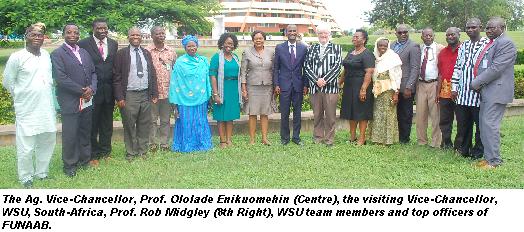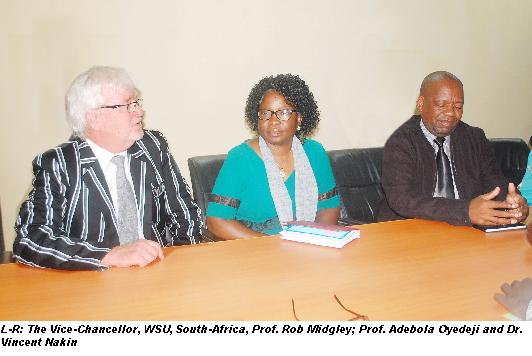The Walter Sisulu University (WSU), Eastern Cape, South Africa, is ready to collaborate with the University in the areas of agricultural business, medicinal plants, waste products and food security. The Vice-Chancellor and Principal of WSU, Professor Rob Midgley, who was in FUNAAB, in the company of Professor Adebola Oyedeji and Dr. Vincent Nakin, sought to know how to turn farming in the rural area into an economy, how to turn a subsistent farmer into a small scale farmer, as well as how a small scale group of farmers can be turned into a commercial entity. He added, “How do I generate business around agriculture? WSU provides a gateway from poverty to some kind of economic improvement for families”.

Describing agricultural engineering as the study of the provision of tools for food security, the scholar said that the section could provide benefits within same community, other than being taking into another community and benefitting from that community. Professor Midgley stated further that WSU team was in FUNAAB, partly to see what kind of opportunities there are to tap from, as well as assess the way which things, as regarding agriculture, were done. His words: “How can we ‘steal’ some of your ideas and implement them there?. How we can get projects that we collaborate and may be able to do a research work together?”. He stressed that both universities share some similarities, noting that they are not different from each other as the problems were alike, as well as the opportunities. He further stated that both institutions could work on the same project and look for funding opportunities together.
Professor Midgley restated the transformation processes of the university, saying that three higher institutions of learning were merged in 2006 to produce WSU. Professor Midgley, who said WSU was a comprehensive university, noted that it has four different campuses in four different cities and has produced four leaders in the Republic of South Africa. He explained the rationale behind the merger, as being economical, so as to guard against having many Vice-Chancellors and Registrars. He, however, noted that the merger was not easy, as various institutions with different cultures were put together.
Responding, the Acting Vice-Chancellor, Professor Ololade Enikuomehin, said that the parley had set a template for both teams to work with, as the Deans and Directors were enjoined to articulate all the views mentioned and come up with a brief that would be examined by the University Management. Professor Enikuomehin, while making a slide presenting about FUNAAB, reeled out the mission and vision statements of the University. He noted that the University was advancing towards a world-class status, a feat that could not be achieved in a day. He highlighted the world-class agenda of the University to be: visionary leadership; commitment to quality, sustainable funding and fund management, research – relevance and quality. Others are: teaching sckills and competences for meaningful learning, community engagement as well as collaboration, partnership and internationalisation. He expressed satisfaction over the imported Kalahari goats from South Africa, saying that they were a pride to the University, which now possessed improved species named Kalahari Red Goats.

The Acting Vice-Chancellor showcased some economically-viable products the University was producing, through the Industrial Park Unit that produces Cassava products, such as ‘garri’, ‘fufu’, cashew nuts, FUNAAB bread, honey, palm oil, palm wine, fish and fish products, cocoa plantation as well as animal products which were poultry and beef, among others. He, however, noted some challenges being encountered in the production processes such as lack of energy and water supply, funding, personnel and equipment, adding that this had posed major obstacle to the entrepreneurial drive in the University. Professor Enikuomehin, who noted that FUNAAB was ready to collaborate with WSU, stated that in relation to building the image of the University to a world-class status, through entrepreneurship and industrial linkages, the University was expected to collaborate with other universities in project work, create a linkage with industries and have the opportunity to enhance the lives of the people.
Highpoint of the parley was the presentation of University’s memorabilia to the guests. Present at the meeting were the Acting Registrar, Dr. Linda Onwuka; Acting Bursar, Mrs. Oluremi Oyewunmi; Librarian, Dr. Mulikat Salaam; Dean, College of Agricultural Management and Rural Development (COLAMRUD), Professor Bolanle Akeredolu-Ale; Dean, College of Plant Science and Crop Production (COLPLANT), Professor Mufutau Atayese; Dean, College of Animal Science and Livestock Production (COLANIM), Professor Oluseyi Oluwatosin; Dean, College of Engineering (COLENG), Professor Johnson Adewumi; Dean, College of Biological Sciences (COLBIOS), Professor David Agboola; Dean, Student Affairs, Professor Adeniyi Olayanju; Acting Dean, College of Veterinary Medicine (COLVET), Dr. Michael Takeet and the Director, Centre for Internationalisation and Partnerships (CENIP), Dr. Sheriff Adewuyi. Others were the Deputy Dean, College of Physical Sciences (COLPHYS), Professor Akinola Akinlabi; Deputy Dean, College of Food Science and Human Ecology (COLFHEC), Dr. Adegoke Bakare and a former Deputy Vice-Chancellor, Academic, Professor Toyin Arowolo.
Meanwhile, FUNAAB is one of the three Nigerian universities visited by the WSU team, others being the University of Ibadan (UI), and the University of Lagos (UNILAG), to establish institutional collaborations.
